Myliza Madison is a sweet baby girl.
A recent family photo features the 7-month-old’s huge smile; another shows a face that is expressively inquisitive.
“She’s just a very bright, loving, personable child and loves people, loves looking at faces, is very receptive to conversation,” said her mother, Charity Madison.
Her older sister has lovingly bestowed on her a host of nicknames, including Looey, Chub Chub, Chunky Cheeks and Lizie Lou.
On the exterior, Myliza appears happy and healthy. Indeed, she is in the 100th percentile for weight at her age. And that wide smile.
But on the inside, she is fighting for her life.
On Dec. 30, Myliza was diagnosed with infant leukemia, a rare disease that strikes just 160 children under the age of 1 every year in the United States. She has been undergoing treatment — chemotherapy and immunotherapy — ever since, spending day upon day in the hospital.
“She has been through more trauma than I have in my lifetime,” her mother said. “She is still so quick to smile when she sees someone enter the room. That says so much to me about her character and resiliency.
“She is a very calm-tempered child, and doesn’t fuss a lot even though she’s been poked and prodded and touched many different times in not-so-pleasant ways.”
Acknowledging the road ahead is long and difficult, Charity says months into the fight that Myliza’s indomitable spirit, bolstered by the support of family and community members, looks to be winning the battle.
A grandmother’s intuition
Myliza started with a fever on Dec. 3 while 4-year-old sister M’Rylee was also feverish with a cough, sore throat and runny nose. But Myliza’s fever was high, so her mother took her to get checked out by her primary care physician. The doctor assured her it was likely just a virus.
The fever would pass as the infection ran its course, the doctor said, and they returned to their home in The Lakes at Rancho El Dorado, where the family has lived for more than four years.
But then Myliza started projectile-vomiting, her skin turning pale and a bit yellowish. They went back to the doctor and left this time with anti-reflux medication and advice to follow a dairy-free diet.
A week later, Charity noticed her baby’s health declining slowly, her reflexes and interactivity diminishing.

“Her eyes were tired whenever she woke up from a nap,” she said, “so there were a lot of signs that just something wasn’t right. But I had been taking her to the doctor, so I was just trusting his judgment.”
It was Charity’s mom who implored her to take Myliza to the emergency room. Call it a grandmother’s intuition.
“On Dec. 29, I get a knock on the door at 8:30 p.m. and it was my mom,” Charity recalled, her voice breaking. “She was having almost a panic attack. She said, ‘Something’s not right, you need to take Myliza to the ER right now.’”
Charity’s mom told her she was working a puzzle, in solitude, when the Lord spoke to her, telling her something was seriously wrong with her granddaughter.
“I was very angry at her, and I said, ‘Mom, I’m getting both girls down for bed,’” Charity recounted. “’This is ridiculous. I’ve been taking her to the doctor. I’ll take her to the doctor tomorrow.’ Well, she insisted.”
So, Charity Googled the nearest children’s hospital, grabbed a few items, put her daughter in the car seat and headed to Banner Desert Medical Center in Mesa. Flustered by her mother’s insistence, she would not remember much of the 35-minute drive north.
At the ER, Myliza was fast asleep in her car seat while Charity checked in. As she sat down and looked around — there were other kids coughing or showing other signs of being outwardly sick. “I was just thinking the whole time ‘this is ridiculous,’” she said. “I just want to be home in my bed.”
Four hours later, they were called back, and then another couple hours passed before they started to draw blood. Right away, nurses became concerned at the color of Myliza’s blood. A doctor soon came in to feel around the baby’s tummy and discovered she had enlarged organs. He immediately ordered scans and a full blood workup.
Soon thereafter, the doctor was back. They’re having a hard time assessing her blood, Charity heard him say, it could be an oncology problem. She didn’t hear the rest of his words.
“Finally, it started to sink in, my daughter might be really sick,” Charity said.
Later, nearly 11 hours after arriving at the ER, a new doctor came in, her eyes pinned to the floor.
“I said, what’s wrong with my daughter?” recalled Charity, who by then had been joined in the ER by her husband, Glenn. “Tell us what’s wrong. Do you have any answers yet?”
“Your daughter has leukemia,” the doctor responded.
Charity screamed.
“I think the whole hospital heard me. My husband grabbed me, and we just cried” as they watched their baby sleeping, she said.
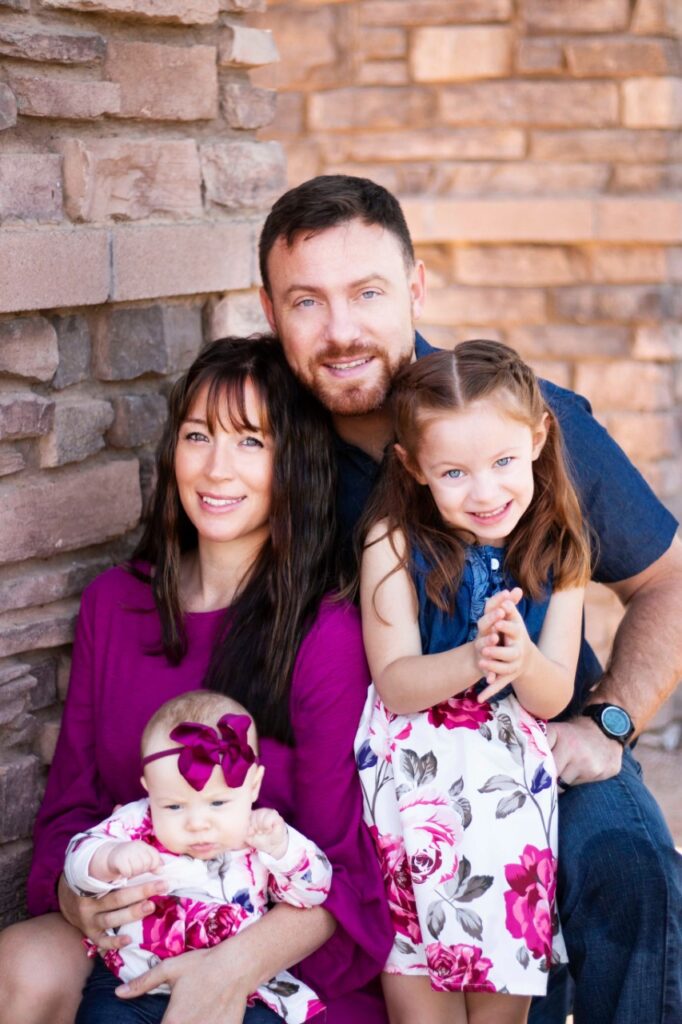
Leukemia is a type of cancer that affects the blood cells made by the body. Typically, infants can make the proper number of white blood cells to fight off illness and infection. Infants with leukemia make too many white blood cells, making it impossible for the body to have the right amount of other blood cells, including red blood cells and platelets.
Myliza was diagnosed with acute lymphoblastic leukemia (ALL), which begins in the immune system and affects a type of immature white blood cells called lymphocytes. About 90 cases of infant ALL are diagnosed every year, according to a 2016 review of studies. (A second type, acute myeloid leukemia, which begins in the bone marrow, represents about 70 diagnoses annually.)
Myliza also has the mixed-lineage leukemia 1 (MLL1) gene, which means a more difficult fight, her mother said.
Interestingly, more females are diagnosed with infant leukemia and more males are diagnosed beyond the first birthday, according to the National Cancer Institute. Infants with leukemia tend to get sicker much faster and have more severe symptoms than older children.
Within hours of her diagnosis, doctors had given Myliza a “PICC” line, a catheter to provide easy access to large central veins near the heart — so that induction treatment could start immediately.
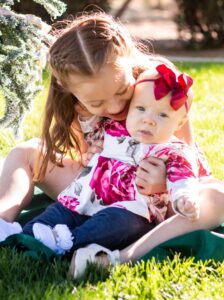
“It is a very long journey,” Charity said.
When InMaricopa talked with Charity in mid-March, Myliza was 58 days into treatment. Over that time, she had required seven blood transfusions — both for hemoglobin and platelets — to rebuild blood cells.
“So, that’s seven people that have graciously donated blood for my daughter,” Charity said. “She definitely gets a lot more energy after a blood transfusion.”
She will likely need many more transfusions.
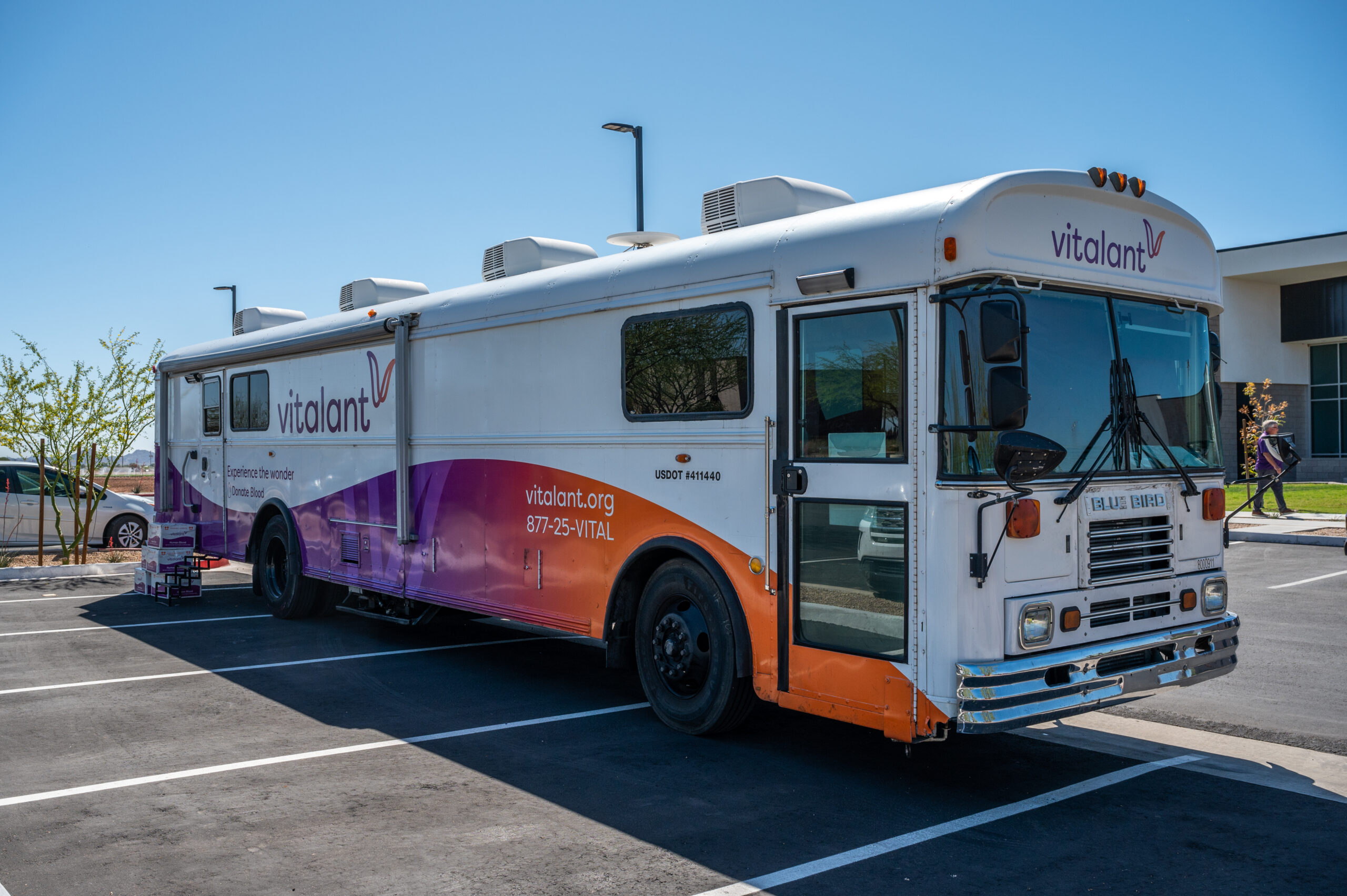
A face on blood donations
Myliza has been able to get blood when she needs it, her mother said. Still, the nation is facing its worst blood shortage in over a decade, according to the American Red Cross, which reported at least 10% fewer donors since the start of the COVID-19 pandemic.
To show gratitude for the blood donations sustaining Myliza’s fight, and to do its part to increase donations amid the shortage, her family will hold a blood drive in association with Vitalant, the nation’s largest independent, nonprofit blood services provider. The organization regularly holds blood drives in Maricopa.
The event, scheduled for April 2, is being coordinated by Lindsey Kreider of the Family Friends and Neighbors program, which focuses on supporting in-home childcare providers.
Kreider said she took advantage of a contact within Vitalant to organize the event, which hopes to draw 30-35 donors, but can accommodate more. She is promoting the drive on social media and placing flyers around town.
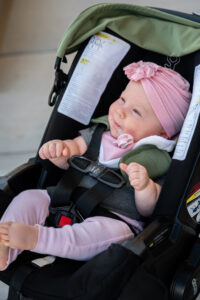
“You hear the cliché, “Donate blood. Save a Life,” but you really don’t know the magnitude of that statement until you see a face attached to it,” she said. “Just attaching Myliza’s face to the meaning behind that is all I can ask for. Just awareness of how impactful it can be in someone’s life by taking time and donating a piece of your heart, essentially.
“My hope is that the next time someone gets approached to donate blood, they will say yes with no hesitation.”
The blood drive is just one example of the support received by the Madisons from family, friends and the community.
Charity works a flexible schedule from home on the hiring team for Trumpet Behavioral Health, a national autism treatment provider, where fellow team members have donated unused time off to make it easier for her to spend days at the hospital.
Her parents, Rick and Ronda Gillespie, who live in The Villages, have been very supportive, watching M’Rylee when Charity is at the hospital and Glenn is at work.
A GoFundMe campaign raised more than $20,000 to help defray medical expenses and Charity’s brother raised another $5,000. A t-shirt campaign by her sister also raised funds and a yard sale organized by the Maricopa Running Club garnered $3,500.
“I don’t know how someone could do it without the support of family,” Charity said. “There’s just a lot of outreach, and I feel like that needs to be recognized because it really has taken a village to get through this.”
And perhaps most surprising, Charity has found an unlikely font of support just next door to Myliza’s hospital room at Banner Desert, where a girl of the same age — they were born eight days apart — also battles leukemia.
“It is crazy how God brought us here together because we could have gone to Phoenix Children’s or anywhere else,” Charity said. The other girl is about six weeks ahead in her treatment.
“I talk with the other mom everyday about our struggles. We lift each other up when the other is down,” she said. “We share what works, what doesn’t. So, we’re living this nightmare together. I would never wish this on anyone, but I’m truly thankful for her friendship.”
Reason for optimism
Charity Madison is talking about how her daughter’s cancer battle is going. With manageable side effects so far, the news is encouraging.
“She is amazing,” she said. “Usually, infants need feeding tubes because they’re nauseous and don’t want to eat. She has been breastfeeding this whole time.”
As if on cue, Myliza has awakened hungry and ready to nurse — she is managing to gain weight during treatment — as Charity talked via phone from her bedside at Banner Desert. During their long hospital stays, Charity sleeps on a pullout couch in the room.
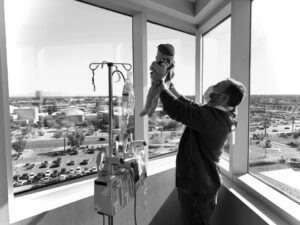
Myliza’s dad visits often and she loves to FaceTime with her sister, who is not permitted to visit the hospital because of strict COVID protocols.
She is currently on blinatumomab, a monoclonal antibody and targeted therapy anticancer drug, which was fortuitously publicized in December as a successful immunotherapy treatment, Charity said.
“The month she was diagnosed, it came out there was a 90% remission rate for infants who receive the therapy upfront before the rest of the treatment,” Charity said. “That what she’s doing now, 28 days of blinatumomab where she is attached to the IV pole and cannot be detached for any amount of time.”
After the induction chemotherapy, doctors extracted a bit of Myliza’s bone marrow and sent it to Seattle Children’s Hospital for testing to determine how many of 100,000 cells were cancerous.
‘She’s going to be OK’
“She’s currently in remission,” Charity said. “It was great, great news. The doctor explained to us (the cancer) is like a tree. We’ve gotten rid of the branches and the trunk, now the rest of treatment targets the roots to make sure this doesn’t come back.”
Myliza’s mom still remembers what a doctor told her at the initial diagnosis.
“The doctor said these simple words: ‘She’s going to be OK.’ And that meant the world to me.”
She would encourage parents going through a similar ordeal to view their child’s cancer diagnosis as just the beginning.
“Embrace every moment you have with your child because this is a story they’re writing … When I first heard the news, I thought Myliza’s life was over. But her life is not over, it’s just begun. You’ll find it’s not a death sentence, it’s just a different story that no one could ever prepare for. But they’re special and God has His hands on them.”
• • •
How to donate blood in Myliza’s honor
It’s not too late to donate blood in Myliza Madison’s honor.
April 11
Vitalant Bloodmobile
Central Arizona College – Lot A
17945 N. Regent Dr.
10 a.m. to 2 p.m.
April 23
Vitalant Bloodmobile
Church of Jesus Christ of Latter-day Saints
20565 N. Homestead Drive
8 a.m. to 1 p.m.
Vitalant Donation Center
1989 W. Elliott Road, #32
Chandler, AZ 85224
877-25-VITAL
This article was first published in the April edition of InMaricopa magazine.


![3 things to know about the new city budget Vice Mayor Amber Liermann and Councilmember Eric Goettl review parts of the city's 2024 operational budget with Mayor Nancy Smith on April 24, 2024. [Monica D. Spencer]](https://www.inmaricopa.com/wp-content/uploads/2024/04/spencer-042424-preliminary-budget-meeting-web-218x150.jpg)


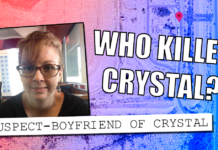



![MHS G.O.A.T. a ‘rookie sleeper’ in NFL draft Arizona Wildcats wide receiver Jacob Cowing speaks to the press after a practice Aug. 11, 2023. [Bryan Mordt]](https://www.inmaricopa.com/wp-content/uploads/2024/04/cowing-overlay-3-218x150.png)



![Alleged car thief released without charges Phoenix police stop a stolen vehicle on April 20, 2024. [Facebook]](https://www.inmaricopa.com/wp-content/uploads/2024/04/IMG_5040-218x150.jpg)

![3 things to know about the new city budget Vice Mayor Amber Liermann and Councilmember Eric Goettl review parts of the city's 2024 operational budget with Mayor Nancy Smith on April 24, 2024. [Monica D. Spencer]](https://www.inmaricopa.com/wp-content/uploads/2024/04/spencer-042424-preliminary-budget-meeting-web-100x70.jpg)


